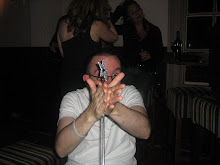 arrying a gold-digging socialite with a manipulative mother. But really it was the launching pad for Deanna Durbin who, by the age of 14, was the biggest paid star in Hollywood at the time but I have never heard of her. Here she plays youngest sister Penny Craig the one who seems to be able to solve all the problems but is also a lot more precocious then her two older sisters. Durbin was also a recording artists and one of the things that really irked me about the film was the need for her to burst into song every so often I felt that these sequences really slowed the film down. Of course this being a basic farce the main joke is mistaken identity as their father's business associate arranges for a penniless Hungarian count to romance the gold-digger but they end up mistaking him for an Anglo-Australian lord who in turn falls for middle sister Kay. In the end though everything works out as Penny runs away their father realises his mistake in marrying the gold-digger and eventually reunites with their mother. The two older sisters find love with the business associate and the lord respectively and the gold-digger and the mother end up on a ferry journey with the Hungarian count. The film was so succesful that it spawned a sequel however Barbara Reed who played Kay did not return for the sequel. Meanwhile Durbin only lasted for about fifteen years in Hollywood ending her film career in the late 1940s and never giving an interview after 1948, while the other actresses who played the girls also had short-lived careers.
arrying a gold-digging socialite with a manipulative mother. But really it was the launching pad for Deanna Durbin who, by the age of 14, was the biggest paid star in Hollywood at the time but I have never heard of her. Here she plays youngest sister Penny Craig the one who seems to be able to solve all the problems but is also a lot more precocious then her two older sisters. Durbin was also a recording artists and one of the things that really irked me about the film was the need for her to burst into song every so often I felt that these sequences really slowed the film down. Of course this being a basic farce the main joke is mistaken identity as their father's business associate arranges for a penniless Hungarian count to romance the gold-digger but they end up mistaking him for an Anglo-Australian lord who in turn falls for middle sister Kay. In the end though everything works out as Penny runs away their father realises his mistake in marrying the gold-digger and eventually reunites with their mother. The two older sisters find love with the business associate and the lord respectively and the gold-digger and the mother end up on a ferry journey with the Hungarian count. The film was so succesful that it spawned a sequel however Barbara Reed who played Kay did not return for the sequel. Meanwhile Durbin only lasted for about fifteen years in Hollywood ending her film career in the late 1940s and never giving an interview after 1948, while the other actresses who played the girls also had short-lived careers.I have to say that this is the first film that I didn't really care for. Part of the reason is Deanna Durbin who I would describe as the Shirley Temple of her time, certainly in this film at least. Nan Grey has little to do as eldest sister Joan and Barbara Reed was the only one of the girls that I found particularly likeable. Another problem I had was that their was a massive age gap between Kay and the Lord (played by Ray Milland, the only actor in the film I recognised) but this was never really bought up and was accepted as the norm. There was a bit of fun to be had with the Hungarian count and the manipulative mother as well as the girl's father who was a very weak and harrassed man. At the end of the day it was all very twee and I'm guessing as it was made during the depression in America that people needed cheering up and listening to Durbin's songs and watching all the happy romantic ramblings of The Three Smart Girls. But I for one didn't care for it and didn't think it should've been nominated for an Oscar.

No comments:
Post a Comment